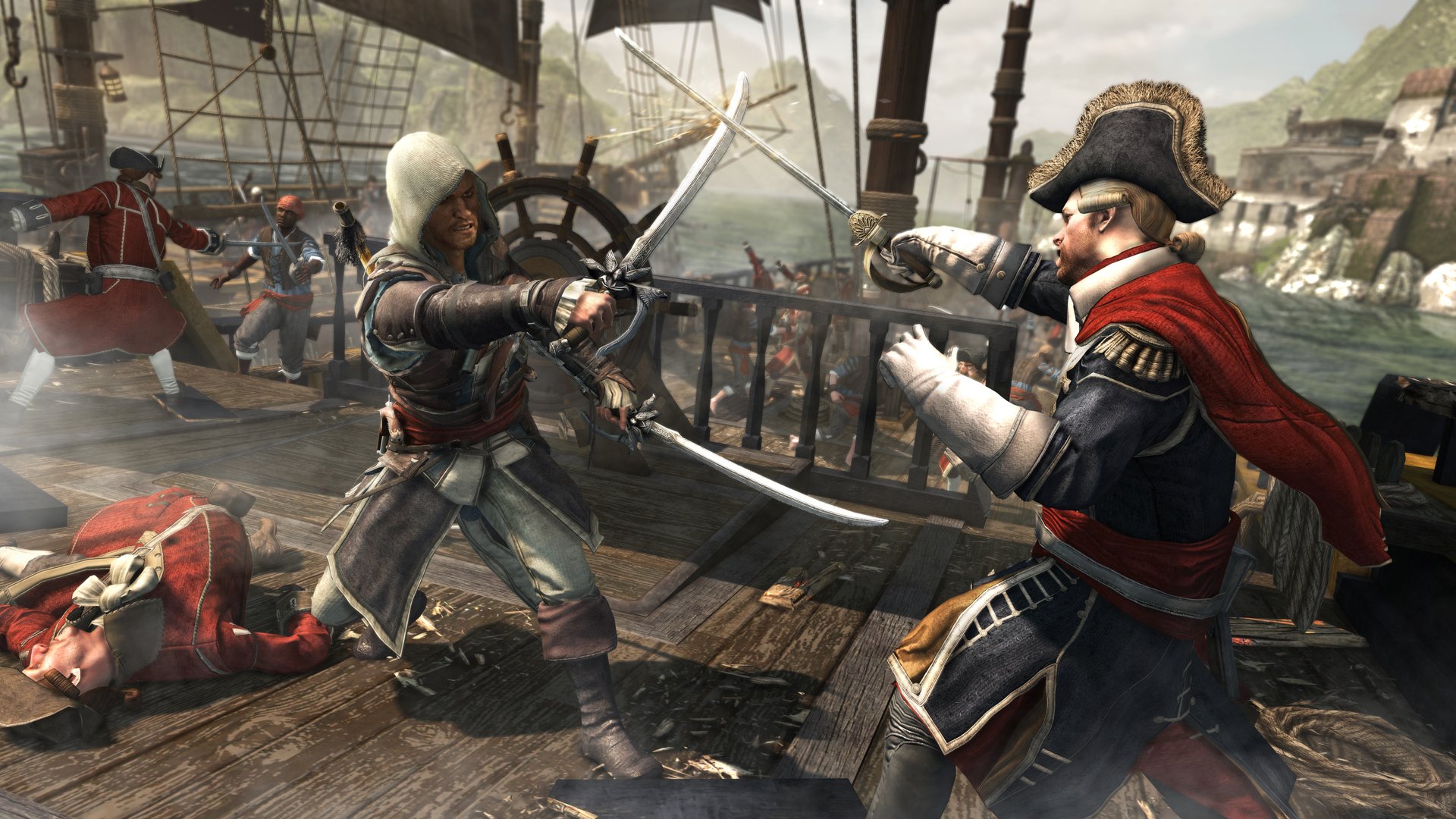In a surprising twist for the triple-A gaming market, Ubisoft (UBSFF +17.72%) and Take-Two (TTWO 1.72%) will reportedly release two of its big upcoming titles for the last-gen Sony (SNE 0.29%) PS3 and Microsoft (MSFT +0.77%) Xbox 360 instead of the eighth generation PS4 and Xbox One.
Ubisoft, which recently confirmed that Assassin's Creed: Unity will be released for eighth generation consoles, is also working on Assassin's Creed: Comet, a new title for seventh generation consoles. Whereas Unity will take place during the French Revolution, Comet will continue the nautical theme of Assassin's Creed IV: Black Flag with a Templar named Shay in 1758, according to a recent report from Kotaku. Both titles are expected to arrive later this year.

Borderlands: The Pre-Sequel. Source: Sony.
Meanwhile, Take-Two's 2K Studios will reportedly bring the next Borderlands title, Borderlands: The Pre-Sequel, to the Xbox 360 and PS3 this fall. Unlike Ubisoft's seventh and eighth generation split strategy, Borderlands: The Pre-Sequel -- which takes place between the first two games of the popular first-person shooter -- is not scheduled to be released for the Xbox One and PS4.
While Ubisoft and Take-Two's decision to stick with seventh generation consoles initially seems odd, it's actually a clever business strategy that has been around for a long time.
Understanding how console cycles work
Previous generation consoles sometimes live on long after newer ones are released, despite being obscured by their more powerful successors:
|
Previous console |
Discontinued |
Final last-gen game (release date) |
Succeeding console |
|
PlayStation 2 (2000) |
2013 |
FIFA 14 (2013) |
PlayStation 3 (2006) |
|
Xbox (2001) |
2008 |
Madden NFL 09 (2008) |
Xbox 360 (2005) |
|
Wii (2006) |
2013 |
Zumba Kids (2013) |
Wii U (2012) |
Source: Wikipedia.
The early partial discontinuation of the Wii was a notable exception, since Nintendo believed that the original Wii was causing marketing confusion and the cannibalization of the Wii U. Meanwhile, Sony has a tradition of keeping consoles alive for well over a decade, so the PS3 is likely to be supported for several more years.
Any game publisher that wants to maximize sales of a single title will release it across both the seventh and eighth generations. Ubisoft did it with Assassin's Creed IV: Black Flag, Activision Blizzard (ATVI +0.00%) did it with Call of Duty: Ghosts, and Electronic Arts (EA +0.05%) released Titanfall for the Xbox One, Xbox 360, and the PC.

Titanfall was released for both 7th and 8th gen consoles.
Understanding the market size of the 7th and 8th generation consoles
Meanwhile, the current difference in market size between the seventh and eighth generation consoles is substantial:
|
7th gen console |
Units sold |
8th gen console |
Units sold |
|
PlayStation 3 |
82.7 million |
PlayStation 4 |
6.7 million |
|
Xbox 360 |
81.1 million |
Xbox One |
4.1 million |
|
Wii |
101 million |
Wii U |
6 million |
Source: Vgchartz.
Since sales of Ubisoft's Assassin's Creed franchise to retailers notably dropped from 12.3 million to 10 million between Assassin's Creed III and Assassin's Creed IV: Black Flag, it would make more sense to release Assassin's Creed: Unity on both seventh and eighth generation consoles. However, development on Unity started over three years ago and was intended to be a graphical showcase for eighth generation systems, just as the original Assassin's Creed was for seventh generation consoles back in 2007. Therefore, to tap into the PS3 and Xbox 360 markets for the holidays, Ubisoft had to double back and release a separate title, Comet.
I doubt that this strategy will pay off, considering the sales decline seen between III and Black Flag. Moreover, Ubisoft's developers have already expressed concerns regarding the game's soaring production budgets, which climbed from $20 million for Assassin's Creed to an estimated $100 million for Black Flag.

Assassin's Creed IV: Black Flag. Source: Ubisoft.
Borderlands, on the other hand, is climbing as Assassin's Creed is slipping. Sales to retailers jumped from 5.3 million units for Borderlands to 7.5 million for Borderlands 2. Its upcoming release for the PS Vita means that sales of the game, originally released in September 2012, could still climb. Despite achieving sales figures comparable to Black Flag, the production costs for Borderlands 2 were much lower, coming in between $30 million to $35 million.
Therefore, Ubisoft could actually be taking a huge risk by releasing two different Assassin's Creed titles this year, while Take-Two could profit handsomely from a single last-gen release.
Will more last-gen releases throttle sales of next-gen consoles?
As I mentioned in a previous article, graphical upgrades between console cycles have been getting harder to notice ever since publishers started releasing cross-platform titles for sixth generation consoles.
If more publishers like Ubisoft and Take-Two continue supporting seventh generation consoles, it's possible that some gamers will hold on to their PS3s and Xbox 360s a little while longer to wait for PS4 and Xbox One prices to drop. We've already seen Microsoft slash prices, and a recent report at Dualshockers revealed that a limited-time discount at Target (TGT +0.14%) brought the cost of the Xbox One console down to $330, since the $450 bundle included a copy of Titanfall ($60) and a 13-month Xbox Live Gold membership ($60).
Of course, it's too early to tell how the eighth generation console war will end at this point, but consumers might be the biggest winners of all if publishers keep seventh generation consoles alive with new games like Comet and Borderlands: The Pre-Sequel.






